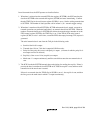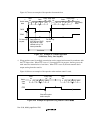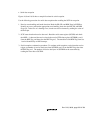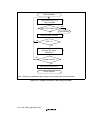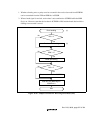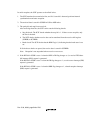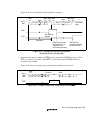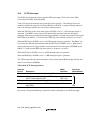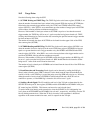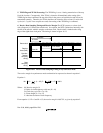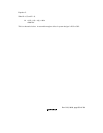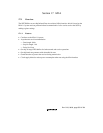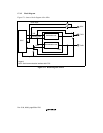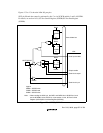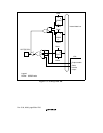
Rev. 5.00, 09/03, page 551 of 760
16.5 Usage Notes
Note the following when using the SCIF.
1. SCFTDR Writing and TDFE Flag: The TDFE flag in the serial status register (SCSSR) is set
when the number of transmit data bytes written in the transmit FIFO data register (SCFTDR) has
fallen below the transmit trigger number set by bits TTRG1 and TTRG0 in the FIFO control
register (SCFCR). After TDFE is set, transmit data up to the number of empty bytes in SCFTDR
can be written, allowing efficient continuous transmission.
However, if the number of data bytes written to SCFTDR is equal to or less than the transmit
trigger number, the TDFE flag will be set to 1 again even after having been cleared to 0. TDFE
clearing should therefore be carried out after data exceeding the specified transmit trigger number
has been written to SCFTDR.
The number of transmit data bytes in SCFTDR can be found from the upper 8 bits of the FIFO
data count register (SCFDR).
2. SCFRDR Reading and RDF Flag: The RDF flag in the serial status register (SCSSR) is set
when the number of receive data bytes in the receive FIFO data register (SCFRDR) has become
equal to or greater than the receive trigger number set by bits RTRG1 and RTRG0 in the FIFO
control register (SCFCR). After RDF is set, receive data equivalent to the trigger number can be
read from SCFRDR, allowing efficient continuous reception.
However, if the number of data bytes in SCFRDR exceeds the trigger number, the RDF flag will
be set to 1 again even after having been cleared to 0. RDF should therefore be cleared to 0 after
being read as 1 after all the receive data has been read.
The number of receive data bytes in SCFRDR can be found from the lower 8 bits of the FIFO data
count register (SCFDR).
3. Break Detection and Processing: Break signals can be detected by reading the RxD pin
directly when a framing error (FER) is detected. In the break state the input from the RxD pin
consists of all 0s, so the FER flag is set and the parity error flag (PER) may also be set. Note that,
although transfer of receive data to SCFRDR is halted in the break state, the SCIF receiver
continues to operate, so if the BRK flag is cleared to 0 it will be set to 1 again.
4. Sending a Break Signal: The I/O condition and level of the TxD pin are determined by the
SCP4DT bit in the port SC data register (SCPDR) and bits SCP4MD0 and SCP4MD1 in the port
SC control register (SCPCR). This feature can be used to send a break signal.
To send a break signal during serial transmission, clear the SCP4DT bit to 0 (designating low
level), then set the SCP4MD0 and SCP4MD1 bits to 0 and 1, respectively, and finally clear the TE
bit to 0 (halting transmission). When the TE bit is cleared to 0, the transmitter is initialized
regardless of the current transmission state, and 0 is output from the TxD pin.



